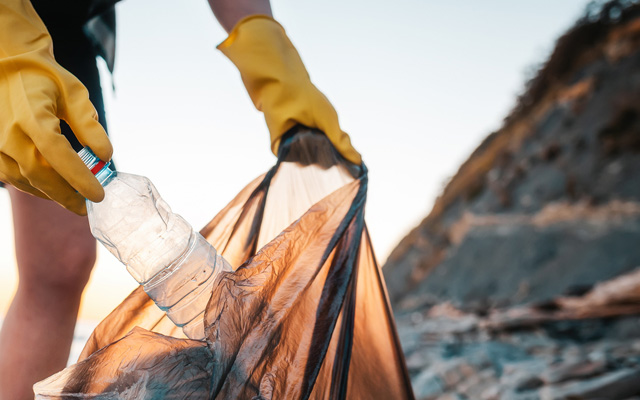Want to get involved but not sure how? Here are some top tips to get you started.

Make sure you have the right equipment
You will need some essential equipment to carry out a beach clean safely. You will need bags to collect the litter and litter pickers are really important so that students aren’t handling litter directly.
Even when using litter pickers, it is strongly recommended that everyone wears gloves and washes their hands thoroughly once they’ve finished the beach clean.
Dress appropriately
Of course, you will need to ensure that everyone is dressed appropriately for this activity. Layers are a good idea for helping everyone to be at a comfortable temperature – and, remember, beaches are often a bit windier than inland areas.
You will also need to wear sturdy, close-footed shoes – this is not an activity for flip-flops!
And if it is hot, a hat is really important for keeping the sun off your head. Don’t forget the sunblock and water in a reusable bottle too!
Plan ahead
It’s all well and good conducting a beach clean but you need to think ahead about what you’re going to do with the litter that you collect.
At the very least, you’ll need to know where the nearest bins or refuse collection points are. But, if you can, try to include some time within your beach clean activity to sort the litter collected, so that anything that can be recycled is sent for recycling.
Check beforehand whether the local authorities already have beach cleaning initiatives in place. If they do, they may be able to provide equipment. They may even ask you to hand the litter you collect over to them for analysis.
In terms of how much time you should spend on your beach clean, remember that it can be quite an energetic activity, so you really don’t need to spend longer than an hour doing this. And even five minutes can make a real difference to the local environment.
If you can, try to arrange your beach clean for low tide, as more of the beach will be accessible and it’s that bit safer for children.
And if it is hot, remember to plan for plenty of breaks in the shade if you intend to be on the beach for a while.
Give clear guidance
Before you start your beach clean, make sure you brief your group on what they should be collecting.
They absolutely should not be picking up anything sharp, whether that’s broken glass, needles or anything of the sort, even with the litter pickers. If they find this type of litter, they should inform the nearest staff member.
They should also avoid anything particularly heavy – again, if they find anything particularly substantial they should be told to inform the nearest staff member.
And they need to be told to be very careful with any oil or liquids. Really, they should avoid emptying out any liquids, even those that they feel are identifiable (such as soft drinks in a bottle), just in case there are any chemicals or other harmful substances present. Again, they should be told to inform the nearest staff member if they find anything like this.
Make it a teaching moment
This is obviously a great opportunity to talk to your students about waste and waste management, as well as the effects of plastic pollution and litter on beaches.
If you can, you could also sort the litter you collect so that as much as possible is recycled and this would be a great opportunity to talk to your students about the importance of recycling when they get back home.
Keep your impact positive
Doing a beach clean is a great way to make a positive impact on the local environment but it is important to keep a couple of things in mind to ensure that your impact remains a positive one.
Firstly, it’s imperative that your beach clean doesn’t interfere with the local wildlife, so please do remind your group to be mindful of any animals, birds or other wildlife on and around the beach.
This includes not picking up any natural material, whether that’s driftwood, dead fish or even shells – these may have an inhabitant that won’t be too thrilled about being scooped up by curious children!
And, finally, make sure your group doesn’t create any more litter. Bring water in reusable bottles and, if you decide to enjoy a picnic before or after your beach clean, try to ensure that you’re not using single-use plastics or creating any more litter.
We hope you find this article helpful. If you do decide to include a beach clean on your school trip, please take a pic and tag us in your social media posts – we’d love to see how you get on!